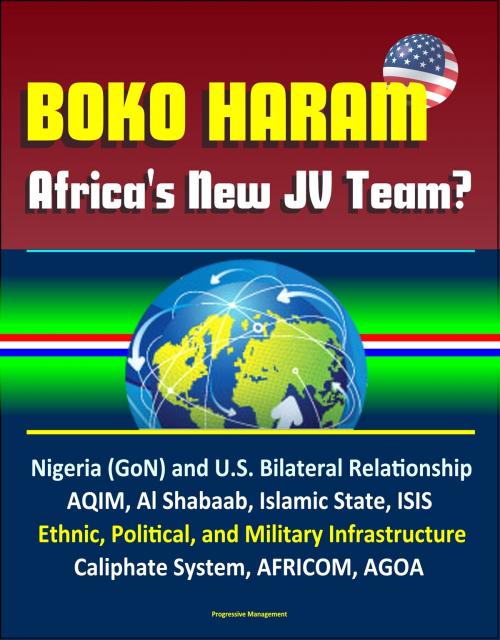Boko Haram: Africa's New JV Team? Nigeria (GoN) and U.S. Bilateral Relationship, AQIM, Al Shabaab, Islamic State, ISIS, Ethnic, Political, and Military Infrastructure, Caliphate System, AFRICOM, AGOA
Nonfiction, History, Africa, Social & Cultural Studies, Political Science| Author: | Progressive Management | ISBN: | 9781370091812 |
| Publisher: | Progressive Management | Publication: | October 4, 2016 |
| Imprint: | Smashwords Edition | Language: | English |
| Author: | Progressive Management |
| ISBN: | 9781370091812 |
| Publisher: | Progressive Management |
| Publication: | October 4, 2016 |
| Imprint: | Smashwords Edition |
| Language: | English |
This important report has been professionally converted for accurate flowing-text e-book format reproduction. This study examines the threat Boko Haram poses to Nigeria and its neighbors in West Africa, and determines the extent to which ensuing regional instability may or may not threaten United States (U.S.) national interests in the region. Among our conclusions, from the examination of U.S.-Nigerian relations over time, is that the United States generally acts in response to the media's ability to incite a public outcry and less in regard to threats to perceived national interests.
Boko Haram, initially viewed as a problem internal to Nigeria given its Nigeria-focused agenda, has since developed relations with influential transnational and international terrorist organizations, such as Al-Qaeda and the Islamic State (IS). It is our position that sponsorship from other terror organizations will make Boko Haram more dangerous and capable of threatening regional stability, ergo impacting U.S. security interests. On the basis of whether a terrorist group seeks state-level sovereignty or inclusion into an existing state, we propose several stop-gaps that, if applied effectively, could serve as countermeasures to hinder Boko Haram's ability to move from being a peripheral to an important or even vital threat to United States interests in West Africa.
To examine this question in greater detail requires treating Boko Haram as a Sovereignty-Seeking Terror Organization (SSTO) as opposed to an Inclusion-Seeking Terror Organization (ITO). We define SSTOs as organizations that seek ethnic or theological primacy through the acquisition of sovereign territory. Specifically, an SSTO seeks to acquire territory, and in exchange for their support, populations within captured territories can expect the "sanctity of the social contract"37 to be upheld. Conversely, ITOs recognize a degree of ethnic, political or sectarian underrepresentation and seek to utilize a variety of means to gain wider political recognition, or societal inclusion in a pre-existing state. In sum, ITOs seek a degree of inclusion in the established government or state structure while SSTOs seek autonomy or separation, ranging from partial to full independence. Given this dynamic, we suggest that the BH insurgency, and that of IS, represent yet another form of sovereignty-seeking organization, which is not novel in its goals but rather in its approach to achieving autonomy.
This important report has been professionally converted for accurate flowing-text e-book format reproduction. This study examines the threat Boko Haram poses to Nigeria and its neighbors in West Africa, and determines the extent to which ensuing regional instability may or may not threaten United States (U.S.) national interests in the region. Among our conclusions, from the examination of U.S.-Nigerian relations over time, is that the United States generally acts in response to the media's ability to incite a public outcry and less in regard to threats to perceived national interests.
Boko Haram, initially viewed as a problem internal to Nigeria given its Nigeria-focused agenda, has since developed relations with influential transnational and international terrorist organizations, such as Al-Qaeda and the Islamic State (IS). It is our position that sponsorship from other terror organizations will make Boko Haram more dangerous and capable of threatening regional stability, ergo impacting U.S. security interests. On the basis of whether a terrorist group seeks state-level sovereignty or inclusion into an existing state, we propose several stop-gaps that, if applied effectively, could serve as countermeasures to hinder Boko Haram's ability to move from being a peripheral to an important or even vital threat to United States interests in West Africa.
To examine this question in greater detail requires treating Boko Haram as a Sovereignty-Seeking Terror Organization (SSTO) as opposed to an Inclusion-Seeking Terror Organization (ITO). We define SSTOs as organizations that seek ethnic or theological primacy through the acquisition of sovereign territory. Specifically, an SSTO seeks to acquire territory, and in exchange for their support, populations within captured territories can expect the "sanctity of the social contract"37 to be upheld. Conversely, ITOs recognize a degree of ethnic, political or sectarian underrepresentation and seek to utilize a variety of means to gain wider political recognition, or societal inclusion in a pre-existing state. In sum, ITOs seek a degree of inclusion in the established government or state structure while SSTOs seek autonomy or separation, ranging from partial to full independence. Given this dynamic, we suggest that the BH insurgency, and that of IS, represent yet another form of sovereignty-seeking organization, which is not novel in its goals but rather in its approach to achieving autonomy.















